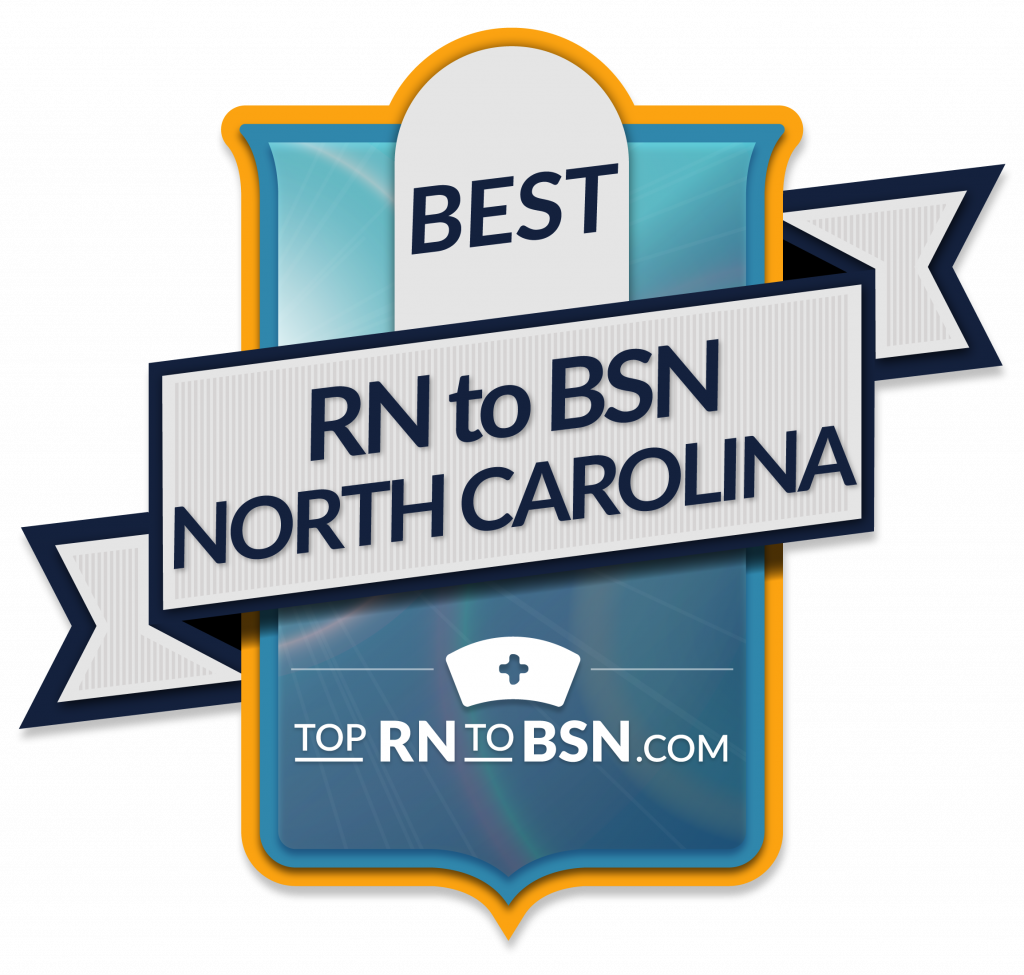
RN to BSN in North Carolina
The best North Carolina online RN to BSN Nursing Schools have affordable and accredited programs for nurses to advance their careers. If you’re an RN in the Tarheel State, an online North Carolina RN to BSN program may be the right choice for you. North Carolina is one of the top states for nursing, thanks to the wealth of world-class teaching hospitals, medical centers, and clinics concentrated in three growing metropolitan regions: the Triangle, the Triad, and also Charlotte. According to the American Nurses Association, North Carolina is one of the ten states with the highest job growth in nursing. This is when working RNs consider taking the next career step.
RN to BSN in North Carolina: The Online Option
An online RN to BSN degree completion program is often the most convenient choice for working nurses. Nurses in an online program can fit their coursework into their schedule, without adding more commuting time or missing classes because of shift changes. In North Carolina, nurses can attend some of the nation’s most affordable online RN to BSN programs. TopRNtoBSN ranked the 15 Best Online North Carolina RN to BSN Programs for working RNs wanting to go further. Our ranking is based on 3 factors:
- Reputation (the institution’s U.S. News & World Report’ overall score)
- Cost (per online credit)
- Success Outcomes (from College Scorecard)
All of the programs listed here are regionally accredited by SACS, and most are CCNE-accredited as well. Although some require clinical practice, those credits can usually be earned close to home, and all coursework is online.
1. Appalachian State University

Appalachian State University is the foremost public university in the Appalachian Mountains, recognized as a crucial component of professional and technical education for the region and a key to preserving Appalachian culture. Though it began as a teacher training school in 1899, after joining the University of North Carolina system in 1971, App State has grown into a leader in many other fields, especially health science, and nursing. Appalachian is ranked in the top 10 regional universities in the South by U.S. News & World Report, and regularly named the best value by Kiplinger’s and also the Princeton Review.
Much of its student body lives in remote, rural areas of the Appalachians. So, ASU is a forerunner in online education. Furthermore, the Appalachian online RN to BSN degree program is a prime example of App State’s excellence in online education. This fully online, CCNE-accredited program is specifically for working nurses. For example, students can complete the 30 credit program and earn a BSN in just one year. It’s a convenient, affordable degree from one of the first names in North Carolina nursing.
2. UNC Wilmington
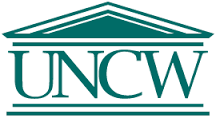
UNC Wilmington started as a private junior college in 1947. It was part of the nationwide effort to meet the educational needs of returning WWII veterans. As demand overtook the school’s ability to keep up, the junior college became a public community college. Then, it became a state college and joined the UNC system in 1969. Today, UNC Wilmington is ranked by U.S. News & World Report as one of the top 20 regional universities in the South and a perennial Kiplinger’s best value. Wilmington is mainly well known for its nursing programs, with a School of Nursing dating back to the 1960s.
UNCW’s online RN to BSN degree program is a 31-credit program designed for working North Carolina nurses to complete their BSN. All coursework is entirely online, using an accelerated, 7-week course format that allows students to begin at six different points throughout the year. This flexibility enables well-prepared, full-time students to complete their BSN requirements in just one year. UNCW has a long-established history as the best value. Additionally, its low cost per credit helps students earn the credentials they need for advancement without going into debt.
3. Western Carolina University
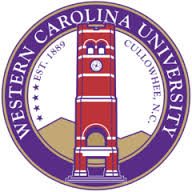
Founded in 1888 as the Cullowhee Academy, Western Carolina University came about as a grassroots effort of the people of the Appalachian Mountains to improve their education options on their own power. The small high school grew into a normal school, a teacher’s college, and eventually a state college, all the while developing a reputation as a central element of higher education in the Appalachians. Today, Western Carolina is ranked one of the top 40 regional universities in the South and is especially known for its community engagement and outreach.
Part of Western Carolina’s outreach is its many online degree programs, which make it possible for WCU to provide education to the rural and remote areas of the mountains. WCU’s online RN to BSN degree program is integral to the university’s education, providing well-trained and qualified nurses for the region’s hospitals and health centers. The 32-credit program is designed to be completed in just 2 years. All coursework, including Orientation, is entirely online, and WCU’s tuition rate is among the lowest in the region, making a Western Carolina online RN to BSN an intelligent choice for Carolina nurses.
4. Winston-Salem State University

A public, historically black university in Winston-Salem, NC, Winston-Salem State University is part of the UNC system and one of the state’s best regional colleges. WSSU was founded in 1892 by education reformer Dr. Simon Green Atkins as a teacher training school for African-American teachers. Today, Winston-Salem State is recognized by the Wall Street Journal as the top public HBCU in North Carolina and is particularly significant for its health science programs. Diverse Issues in Higher Education has ranked WSSU as the top college in North Carolina for graduating black nurses and health professionals.
The WSSU online RN to BSN degree program is intended for working nurses with an active RN license for North Carolina and an associate’s degree or nursing diploma. Students must also have at least 51 transferrable credits. WSSU’s BSN offers three different starting periods – winter, spring, and fall – and all coursework can be completed online. Students can also opt for a Competency-Based Education Program (CBE), which allows them to work through the same material as the conventional BSN in an alternative format. Students in the CBE program can complete the curriculum at their own pace by passing competencies. WSSU has a strong reputation in the Triad region of North Carolina, giving graduates access to a large healthcare job market.
Related: Best HBCU for Nursing Colleges and Schools
5. North Carolina Central University

One of U.S. News & World Report’s top-ranked national HBCUs, North Carolina Central University is a public university founded in 1910. Central’s original mission was preparing teachers and providing adult education for the African-American communities of central North Carolina. Its location in Durham, NC, in the historic, once self-sustaining Hayti neighborhood, made it one of the region’s most influential black colleges. Today, Central is ranked as a top-tier regional university for the South and is a crucial educator for black professionals in North Carolina.
NC Central has been educating nurses since 1948, and Central’s online RN to BSN degree program is bringing that history into the 21st century. The Central program is open to current North Carolina RN license holders with an associate’s degree or diploma. For those who have all prerequisites, only 22 credits, all fully online, are needed. The most prepared, full-time students can complete their degree in just one year. With Central’s location in Durham – part of the Research Triangle and a hub of cutting-edge medicine – nursing graduates have their pick of jobs.
25 Best Nurse Residency Programs Post-BSN
6. East Carolina University

The third-largest university in North Carolina, East Carolina University, dates back to a teacher training school established in 1907. The demand for higher education opportunities in eastern North Carolina – a rural region with few other options – was high enough that the school grew into a college, then a university, by 1967. Most of that growth and development was in the health sciences; ECU offers only medical and dental schools. The College of Nursing, meanwhile, is a comprehensive nursing program recognized as a Center of Excellence by the National League for Nursing, graduating more nurses than any other school in the region.
ECU’s online RN to BSN degree program brings all that historic excellence to a distance format. The online BSN completion program is for working nurses, with a convenient structure and flexible scheduling. Many courses are offered in accelerated block format, allowing students to complete two 7-week courses per semester. While some courses require practical experiences, the student can complete these in their own area. With the South’s most trusted name in nursing, ECU BSN graduates can be assured that their investment will take them places.
7. UNC Charlotte
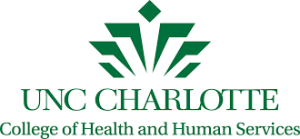
UNC Charlotte is the fastest-growing member of the UNC system. The North Carolina city of Charlotte is one of the nation’s fastest-growing cities. Its booming economy is tied to the banking, finance, and also tech industries. UNCC began as an extension campus of UNC in 1948 to provide education for the many WWII veterans using the GI Bill. Today, UNC Charlotte is a comprehensive, public research university. Furthermore, it ranks as a top college for social mobility with national recognition. UNCC is especially known for professional programs related to urban life, including business, computing, and health and human services.
The School of Nursing offers UNC Charlotte’s online RN to BSN degree program, a CCNE-accredited, degree-completion program. Working, licensed RNs with an associate’s degree or diploma are eligible to apply. And those with full prerequisites can finish their degree in just one year. All coursework is entirely online. UNCC’s reasonable tuition rate and short time frame mean students can potentially earn their BSN for less than $5000. Graduates enter one of the nation’s most thriving job markets. So, UNC Charlotte’s online RN to BSN is one of the best options for Carolina nurses.
8. Barton College
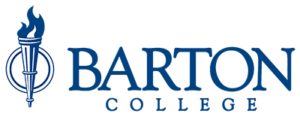
Barton College is a small liberal arts college of just over 1100 students in the small city of Wilson, NC. The Disciples of Christ church started Barton College in 1902. It was a small bible college but expanded with adult education and outreach in the 1990s. Today, Barton is still small, but its impact has become much larger, as well as its reputation. Barton College is one of the top 10 regional colleges in the South according to US News & World Report. Additionally, it is a top 10 best value, and its profile is only growing.
Barton College’s online RN to BSN degree program is the school’s first fully online degree. This CCNE-accredited degree is for working nurses in North Carolina with an active RN license and an associate’s degree. The school prefers applicants from accredited North Carolina community colleges. The RN to BSN is entirely online for students with all of these qualifications. Students take 35 credits over three semesters (fall, spring, and summer) to complete their BSN in only one year.
9. North Carolina A&T State University

One of the most esteemed HBCUs in the nation, North Carolina A&T State University is a public research institution in Greensboro, NC, part of the state’s growing Triad region. Founded in 1891, A&T was North Carolina’s land-grant university for African-Americans, when black students were not accepted into the state’s public universities. A&T made the most of its opportunity, turning its foundation in agriculture and mechanical engineering into one of the state’s premier STEM universities. Today, NC A&T is ranked a top 10 HBCU nationally, the #1 HBCU in North Carolina, and the most prominent HBCU in the nation.
The NC A&T online RN to BSN degree program is one of the state’s most comprehensive and up-to-date BSN programs. Designed for working nurses with an RN license and an associate’s degree, the A&T BSN completion program is intended not only for the bare minimum qualifications. The A&T curriculum also includes significant cutting-edge informatics, global health courses, and instruction in nursing ethics and collaboration. Unsurprisingly, North Carolina’s top HBCU – and one of its most socially conscious, engaged universities – would craft an online BSN that makes both better nurses and better citizens.
11. UNC Pembroke

Officially designated as North Carolina’s Historically American Indian University, UNC Pembroke is one of unique institutions in the South. Founded in 1887 as the Croatan Normal School, UNC Pembroke was a grassroots effort by the Lumbee people of eastern North Carolina to prepare teachers who could help preserve their culture and identity. As it grew into a college, UNC Pembroke played a major role in fighting illiteracy and inadequate education in the rural region. Today, UNC Pembroke is central to professional education in eastern North Carolina, ranked one of the top 50 public regional universities in the South.
UNC Pembroke’s online RN to BSN degree program is a CCNE-accredited degree completion program. It is ideal for working nurses with an associate’s degree and active RN license. The Pembroke BSN is almost entirely online, with only two courses students must take at a distance education center. Students can complete the one-year accelerated format with 8-week courses. Or they can choose a self-paced option. UNC Pembroke is a trusted name in North Carolina’s healthcare system, and the online RN to BSN program is a convenient, manageable way to earn a valuable credential.
12. University of Mount Olive
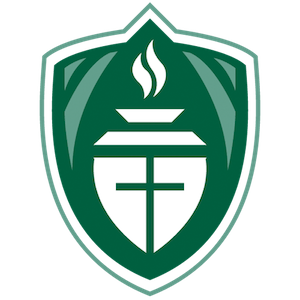
Founded in 1951 by the Original Free Will Baptist Church, the University of Mount Olive had its roots in an earlier institution, Eureka College, which burned down in 1931. While its original role was providing a junior college education for an area without college options, Mount Olive grew through the 20th century into a respected small liberal arts college. Today, Mount Olive is a faith-based university with a liberal arts foundation. It strives to produce Christian leaders in professions ranging from business and criminal justice to nursing.
Mount Olive has emphasized adult education for decades, and the university has turned to use online education to extend its reach. Since 2012, the University of Mount Olive’s online RN to BSN degree program has prepared nurses for higher responsibilities. The Mount Olive BSN is available fully online for working RNs with an associate’s degree, and it’s one of the most flexible, convenient programs available. Most courses take an accelerated, 5-week format. And all are asynchronous with no defined start times. Students can enter the program at six different times each year. Additionally, they can transfer up to 96 transfer credits and complete the 36-credit BSN in just a year.
12. Gardner-Webb University

Gardner-Webb University began as a private high school in Boiling Springs, NC, founded in 1905 by the Baptist church. Many western North Carolina communities lacked adequate public schools then, and the Baptist high school grew into a junior college in the next 20 years. In 1993 Gardner-Webb became the newest of North Carolina’s many Baptist universities. Long ranked one of the top regional universities in the South by U.S. News & World Report, Gardner-Webb has moved up into the national rankings in recent years. Gardner-Webb has also earned strong rankings for its online degrees, including the national top 100 for nursing.
Gardner-Webb’s online RN to BSN degree program comes from the Hunt School of Nursing, a school steadily rising in reputation and rank. The Davis Nursing RN-BSN focuses on holistic health, emphasizing Christian values, ethical and legal standards, and social responsibility. Gardner-Webb’s primary purpose is to place Christian leaders in professional careers, and nursing, with its opportunities for therapeutic care and emotional support, is a key to that mission. With its reputation on the way up, Gardner-Webb University is a sound choice for aspiring nurse leaders.
13. Fayetteville State University

Part of the UNC system, Fayetteville State University began as the first normal school for African-Americans in North Carolina in 1877. The State Colored Normal School was rooted in the earlier Howard School. It became a model for the education of black teachers. As the city of Fayetteville grew around Fort Bragg and Pope Air Force Base, FSU grew as well; in particular, Fayetteville State’s adult and distance learning programs started in extension programs for military personnel. Today, Fayetteville State is US News and World Report’s top 25 national HBCU and one of the most affordable online educators in the nation.
The Fayetteville State online RN to BSN degree program is one of the best values in nursing anywhere. Working nurses who want to complete their bachelor’s find this RN to BSN program convenient and flexible. All courses are in an accelerated eight-week format. So, full-time students take two courses every term. All coursework is entirely online. Additionally, students must complete two clinical experiences in their home area. This 32-credit program also counts for continuing education units (CEUs) for continuing the RN license, and FSU’s tuition is one of the most affordable rates in North Carolina.
14. Pfeiffer University

Pfeiffer University dates back to 1885, to a home school in rural Caldwell County, in the Appalachian foothills of North Carolina. Settling in the small village of Misenheimer, Pfeiffer gained its name from Henry and Annie Pfeiffer, New York philanthropists who helped the growing junior college build its campus in 1934. Affiliated with the United Methodist Church, Pfeiffer is a respected small liberal arts college. Furthermore, it ranks as one of the top 100 regional universities in the South by US News & World Report.
The Pfeiffer University online RN to BSN degree program is a CCNE-accredited, fully online option for working nurses with an associate’s degree. Led by the Division of Applied Health Sciences, the online RN to BSN provides both fully online courses and residency experience. Licensed RNs with at least six months of work experience are eligible to apply, and working nurses may qualify for prior learning credits based on their experience. Pfeiffer’s online BSN is a top-quality program from a school with a growing reputation.
15. Mars Hill University

The oldest college in western North Carolina, Mars Hill, was founded in 1856 as a Baptist institute. Today, Mars Hill University is a highly respected, small liberal arts university in a suburb of Asheville. While Mars Hill retains its historical identification with Christian values and ethics, the university has been independent of the Baptist church since 2003. The college became a university in 2013, and in addition to its liberal arts programs includes professional schools in education and nursing. US News and World Report ranks Mars Hill as one of the top 25 regional colleges in the South and a top 20 best value.
Mars Hill University’s online RN to BSN degree program comes from the Judge-McRae School of Nursing, one of Appalachian’s most trusted nursing schools. The Mars Hill BSN is not entirely online; it is the only hybrid RN to BSN program in western North Carolina, providing convenient online classes with a once-weekly session at the Adult and Graduate Studies center in Asheville. The RN to BSN curriculum follows Mars Hills’ values, focusing on ethical responsibility, community engagement, and cultural sensitivity. It’s a program all its own, from a university known for quality and value.

How Do I Become a Nurse in North Carolina?
In all states, including North Carolina, a student must enroll in and complete a nursing degree program to become a nurse. There are various levels of nursing from a licensed practical nurse (LPN) to a registered nurse (RN). The major difference is the amount of school a person takes, the degree he or she has earned, and the certifications the individual holds. If the student wants to become a registered nurse (RN), he or she will need a Bachelor’s degree.
The main nursing degrees are:
- Associate degree in nursing (ADN)
- Bachelor of science in nursing (BSN)
- Master of science/Master’s degree in nursing (MSN)
- Doctor of nursing practice (DNP)
Nursing students should be aware of admission requirements such as GPA and transfer credit hours. Enrollment, start dates, financial aid, in-state tuition vs out-of-state, and the two year pass rate for graduates are all valuable information as well.
The NC Board of Nursing license verification means that anyone wishing to practice nursing in North Carolina must pass the National Council Licensure Exam (NCLEX-RN). Obtaining a North Carolina nursing license means the student filled out the appropriate application, submitted the relevant NCBON ID document or NCBOM license renewal document, and provided an official school transcript. In addition, the student must register, pay applicable fees, and then also submit fingerprints. The results of all exams go to the North Carolina Board of Nursing about six weeks after the test date. To maintain an RN license, working nurses must fulfill continuing education requirements.
What is the Best Way to Get a BSN in North Carolina?
Nurses are in high demand all over the US. There are many Nursing Schools in North Carolina from which a student can choose. Registered Nurses that have completed a Bachelor’s program are in the highest demand. The best way to get a BSN is whatever way works best for the student. Some students prefer to take classes on campus and want to see instructors in person. Other students want the flexibility and ease of online classes. There is a lot of student interest in accelerated nursing programs in NC. No matter which path a student chooses, he or she should be sure to select one of the accredited nursing schools NC has available.
Another way to take Nursing in North Carolina is to enroll in a BSN pre-licensure program. These programs are highly competitive and require the students to complete 125 credits. Nursing Colleges in NC offer accelerated BSN programs. There are 2-year Nursing programs in NC, but an accelerated program may only take 11 to 18 months. These programs allow students to transfer credits from a bachelor’s degree to cover the prerequisite classes. This type of program will enable students to build on previous learning or work experiences so they are able to complete their coursework sooner.
How Much Do Nurses Make in North Carolina?
Nursing jobs in North Carolina are plentiful as there are not enough nurses to meet the demand. Employers prefer employees to have a BSN. They are most interested in RNs with a BSN and will pay a higher wage to them. The Bureau of Labor Statistics reports North Carolina nurses’ salaries range from $62,450 to $66,280. The median hourly wage is around $28.88. The median annual salary is $60,060 for NC RN jobs.
A licensed practical nurse (LPN) does not need as much education as an RN. An LPN only requires a diploma, certificate, or degree. An LPN must also receive certification by passing the NCLEX – PN exam. The average LPN salary in NC is $45,000. That is in line with the national average LPN salary. The starting salary is much lower, ss it ranges from $20,000 to $28,000.
The more education and experience a nurse has, the higher the salary available to them. The nursing in North Carolina salary increases drastically based on experience and education. A Nurse Practitioner’s salary NC will average around $99,578. A typical salary range for a nurse practitioner is $92,399 to $108,175.
Some of the most in-demand professional nursing careers include:
- Public health
- Community health
- Women’s health
- Midwifery
The Push for BSNs in North Carolina
The American Nurses Credentialing Center has been pushing for at least 80% of hospital staff nationwide to have a BSN or higher by 2020. The Magnet Recognition Program has made it a priority for many hospitals. Within a few years, then, RNs may not be able to get hospital jobs without a BSN. According to the Bureau of Labor Statistics, registered nurses in North Carolina make around $61,000 a year on average. However, the highest pay rates for nurses are for nurses with advanced degrees.
Related:
- Nursing in North Carolina
- 10 Best Nursing Schools in Charlotte NC
- 25 Best RN to BSN Program with Online Degrees
- Best Nursing Podcasts
- How to Become a CRNA Fast
- Certified Registered Nurse Anesthetist (CRNA) Programs
- Forensic Specialty Nursing Programs
- Best Paying Nursing Fields for the Future
- States in High Demand for Nurses
- Highest Paying Cities for Nursing
- 15 Best Online Accelerated BSN Programs






